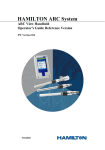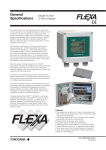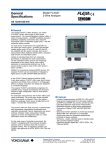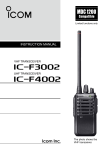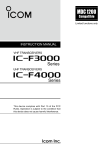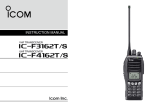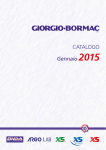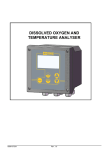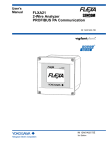Download Model FLXA21 2-Wire Analyzer Start
Transcript
User’s Manual Model FLXA21 2-Wire Analyzer Start-up Manual IM 12A01A02-12E This Start-up Manual explains mainly the installation and wiring of the FLXA21. For detailed information and other information, the User’s Manual of the FLXA21 should be referred to. IM 12A01A02-12E 7th Edition Toc-1 Model FLXA21 2-Wire Analyzer Start-up Manual IM 12A01A02-12E 7th Edition CONTENTS 1. Wiring and Installation..................................................................................1 1.1 Installation site...................................................................................................... 1 1.2 Wiring the power supply...................................................................................... 1 1.3 Wiring the sensor.................................................................................................. 2 1.3.1 pH Measurement................................................................................... 2 1.3.2 ORP Measurement................................................................................ 3 1.3.3 SC Measurement................................................................................... 4 1.3.4 ISC Measurement.................................................................................. 5 1.3.5 DO Measurement.................................................................................. 5 1.3.6 SENCOM pH/ORP Measurement......................................................... 6 1.3.7 Wiring of YOKOGAWA sensors............................................................. 6 1.3.8 Wiring of HAMILTON sensors................................................................ 7 2.Operation..................................................................................................... 10 2.1 Change language................................................................................................ 10 2.2 Quick setup.......................................................................................................... 10 2.3 Basic operation (when two sensors are connected).......................... 11 3.Commissioning.......................................................................................... 12 4.Maintenance................................................................................................ 13 uAppendix..................................................................................................... 14 A1 Installing the cable glands................................................................................. 14 A2 Mounting methods.............................................................................................. 14 Revision Record........................................................................................................i IM 12A01A02-12E 7th Edition : Apr. 17, 2015-00 1. 1 <1. Wiring and Installation> Wiring and Installation Open the front panel and remove the plastic wiring covers, and then install the cable glands (refer to the Appendix A1). The wiring covers will be re-installed after the wiring is completed. 1.1 Installation site The FLXA21 is weatherproof and can be installed both inside and outside. It should, however, be installed as close as possible to the sensor to avoid long cable runs between the instrument and sensor. When a pH sensor is used, the cable length including the sensor cable should not exceed 20 meters (65.6 feet); 60 meters (197 feet) when using BA10 extension box and WF10 cable. For a conductivity sensor the cable run should not exceed 60 meters (197 feet). For dissolved oxygen the sensor cable run should not exceed 30 meters (100 feet). For SENCOM pH/ORP the sensor cable run should not exceed 20 meters (65.6 feet). Select an installation site that meets the following conditions. • Mechanical vibrations and shocks are negligible • No relay switch and power switch are installed close to the converter • There is space for cable connection beneath the cable glands • Not exposed to direct sunlight or severe weather conditions • Maintenance is possible • No corrosive atmosphere • Ambient Operating Temperature: -20 to +55 °C Humidity: 10 to 95% RH (Non-condensing) • Water Protection: IP66 (except Canada), NEMA 4X (except Canada), Type 3S/4X (Canada) If the instrument is installed outside and exposed to direct sunlight, a sun shade hood should be used. The FLXA21 can be mounted on a wall, pipe or panel when the mounting kit is ordered. For dimensional information please refer to the Appendix A2, Mounting methods. 1.2 Wiring the power supply FLXA21 is a 2-wire transmitter and can be powered by a DC power supply of max. 40 VDC. The Power Supply voltage depends on: • The load resistance: impedance of electronic equipment: typically 250 Ohm • Number of input modules: 1-sensor measurement or 2-sensor measurement. One (1) Sensor module (1 input): 16 to 40 V DC (for pH/ORP, SC and DO) 17 to 40 V DC (for ISC) 21 to 40 V DC (SENCOM pH/ORP) Two (2) Sensor modules (2 inputs): 22.8 to 40 V DC (for pH/ORP, SC and DO) Media No. IM 12A01A02-12E 7th Edition : Apr. 2015 (YK) All Rights Reserved Copyright © 2010, Yokogawa Electric Corporation IM 12A01A02-12E 7th Edition : Apr. 17, 2015-00 2-sensor measurement 1295 V - 11.5 R= 0.022 1000 600 Digital Communication Range (HART) 16 17 18 22.8 24.7 Voltage (V) 1295 R= 1000 V - 11.5 0.022 Except SENCOM 600 516 Digital Communication Range (HART) 304 250 250 0 2 <1. Wiring and Installation> Load resistance (Ω) Load resistance (Ω) 40 Figure 1 Supply Voltage and Load Resistance for pH/ORP (analog sensor), SC and DO 0 40 22.86 24.7 17 18 18.2 21 Voltage (V) Figure 2 Supply Voltage and Load Resistance for ISC and pH/ORP SENCOM sensor The power supply is connected to the terminals marked with + and – which corresponds with the polarity of the DC power supply. The shield/ ground is connected to the terminal marked replace ground wiring cover. 1.3 , then Wiring the sensor The FLXA21 can be used with a wide range of commercially available sensor types, both from Yokogawa and other manufacturers. For more detailed information, refer to the respective instruction manual of the sensor. The sensor systems from Yokogawa fall into two categories; the ones that use a fixed cable and the ones with separate cables. To connect sensors with fixed cables, simply match the terminal numbers in the instrument with the identification numbers on the cable ends. The separate sensors and cables are not numbered, but instead use a color-coding system. 1.3.1 pH Measurement Conventional pH sensors are connected to the module as follows: FLXA21 11 Temperature 12 Temperature 13 Reference 14 Solution ground 15 Glass (measure) 16 Shield Jumper holder 17 Shield TC REF Liquid PH Earth IM 12A01A02-12E 7th Edition : Apr. 17, 2015-00 3 <1. Wiring and Installation> In addition to the wiring of the sensor, insure that a jumper for low-impedance sensor inputs is installed. The jumpers can be found on the plastic sensor module cover and can be stored in the lower level module wiring cover. • pH Glass Electrode is a high impedance sensor input • Standard reference electrodes and an ORP/REDOX electrode are low impedance sensor inputs • Special electrodes using 2 glass sensor (example: Pfaudler, SC24V) do not need jumpers. Terminals 15-16 are identified as input 1 (High Impedance) and terminals 13-17 are defined as input 2 (Low Impedance). For conventional pH sensors, the jumper is placed as illustrated: 11 12 14 18 13 17 19 15 16 PH Input 1 Input 2 Glass sensor on Input 1. Reference sensor on Input 2. 1.3.2 ORP Measurement The ORP measurement uses the same sensor input module as the pH measurement. It is not uncommon to measure ORP as process variable and a pH Glass electrode as reference. This is the case with rH measurement and with pH compensated ORP measurement. Conventional ORP sensors are connected to the module as follows: FLXA21 11 Temperature 12 Temperature 13 Reference 14 Solution ground 15 Metal (measure) 16 Shield 17 Shield TC REF Liquid ORP Earth For conventional ORP sensors, the jumpers are placed as illustrated: 11 12 14 18 13 17 19 15 16 PH Input 2 Input 1 Metal sensor on Input 1. Normal reference on Input 2. pH Compensated ORP sensors are connected to the module as follows: IM 12A01A02-12E 7th Edition : Apr. 17, 2015-00 4 <1. Wiring and Installation> FLXA21 11 Temperature 12 Temperature 13 Glass 14 Solution ground 15 Metal 16 Shield 17 Shield TC PH Liquid ORP Earth For pH Compensated ORP sensors, the jumper is placed as illustrated: 11 12 14 18 13 17 19 15 16 PH Input 2 Input 1 Metal sensor on Input 1. pH glass (as reference) on Input 2. 1.3.3 SC Measurement Contacting Conductivity, SC, sensors are connected to the module as follows: 11 + Temp 12 - 13 V14 i- 15 V+ 16 i+ The above diagram shows wiring for 4-electrode conductivity sensors, such as SC42-SP34 large bore series. For 2-electrode conductivity sensors, such as SC42-Sp36 small bore series, jumpers must be installed between terminals 13-14 and between terminals 15-16, as shown in the diagram below. 11 + Temp 12 - 13 V14 i- 15 V+ 16 i+ IM 12A01A02-12E 7th Edition : Apr. 17, 2015-00 1.3.4 5 <1. Wiring and Installation> ISC Measurement ISC40 sensors are connected to the module as follows: 11 + Temp 12 - 13 Receive coil 17 shield 14 Sensor shield (internal) 15 Drive coil 16 shield The sensors are supplied with integral cables and each individual wire is marked with the corresponding terminal numbers. 1.3.5 DO Measurement The input module for DO measurement is suitable for different types of DO sensors: i. Galvanic sensors like model DO30G ii. Polarographic sensors like HAMILTON’S Oxyferm and Oxygold The connection is as follows: 11 TC + 12 TC 16 15 + anode galvanic 13 - cathode galvanic 18 + anode polarographic 14 shield 17 - cathode polarographic The DO30G sensor comes with integral cable and the wires are labeled with the corresponding terminal numbers. IM 12A01A02-12E 7th Edition : Apr. 17, 2015-00 6 <1. Wiring and Installation> 1.3.6 SENCOM pH/ORP Measurement FU20F sensors are connected to the module as follows: Input M9 Connector Shield 82 4 Data+ 83 1 Data- 84 2 Supply Gnd 86 5 Supply 87 6 1.3.7 Wiring of YOKOGAWA sensors Sensor Measurement DO30G FU20 /PH20/FU24 FU20 /PH20/FU24 FU20 /PH20/FU24 FU20-VP /FU24-VP FU20-VP/ FU24-VP FU20-VP/ FU24-VP ISC40 PR20/PR10 DO pH, pH & ORP, rH ORP pH Comp. ORP pH, pH & ORP, rH ORP pH Comp. ORP ISC pH SC21 pH SC24V SC25V pH pH pH Comp. ORP SC29-PTG SC29-PTP ORP SC42 SC4A SM21/SR20 /SM60 SM29 /SR20 SC SC SX42 pH ORP SC 11 11 12 12 Board Terminals 13 14 15 13 14 15 16 16 17 11 12 13 16 17 11 12 13 14 11 12 15 14 E F B E F E 11 11 E E Yes Yes 13/14 Fixed Cable No Yes 13/14 Fixed Cable A Yes No B D Yes Yes 13/14 VP6-SC F A D No Yes 13/14 VP6-SC 12 12 13 13 Yes No Fixed Cable Fixed Cable No No WU20 Triax Yes No VP8-DC VP6-SC F F C B Red Blue 14 14 Liquid Earth H D Liquid Earth Liquid Earth 14 14 11 12 13 11 12 13 Green: Green: Yellow: Black Red Blue Red Yellow: Black Red Brown Brown Sensor Measurement FU20F pH, pH & ORP, rH Fixed Cable No D Yellow: Green 15 Remark Yes Blue 14 Input 2 Input 1 Jumper 18/13 19/15 16 15 15 16 16 Red (White) A A B Fixed Cable VP6-SC D Blue (White) Red (White) 15 15 Red: Red Red: Red 16 16 Red: Yellow: Blue Blue Red: Yellow: Blue Blue WU20 Triax Yes Yes WU20 Triax Yes No Yes Yes WU40 cable Fixed Cable WU20 Color Coded Coax WU20 Color Coded Coax 13/14 and 15/16 Red Board Terminals 82 83 84 86 87 82 83 84 86 87 IM 12A01A02-12E Sensor Wiring Remark WU11 Cable 7th Edition : Apr. 17, 2015-00 1.3.8 7 <1. Wiring and Installation> Wiring of HAMILTON sensors Sensor Measurement CHEMTRODE pH CHEMTRODEORP CHEMTRODEVP 11 12 13 Blue Red 17 18 (White) ORP pH CLARITRODE pH CLARITRODEVP pH CONDCUELL SC CONDCUELLVP SC EASYFERM pH E F E F B A Blue Red B A Blue Red pH E F B pH E F B MECOTRODE pH pH (White) Input 2 Input 1 Jumper Remark 18/13 19/15 WU20D Yes No 13/14 Cable Yes Yes 13/14 Yes No 13/14 VP6-SC Yes No 13/14 WU20D Cable Yes No White/ Blue Green Pink Brown Yellow Grey Black Grey Blue Yellow Black Grey Shield Shield EASYFERMVP INCHTRODE MECOTRODEVP OXYFERMVP/OXYGOLD Board Terminals 14 15 16 E F D Yes No A Yes No A Yes No Yes No Yes No Blue Red B A (White) (White) DO White Green Green/ Yellow Black OXYSENS DO Yellow Blue Black Clear Brown pHEASY pH POLILYTE pH POLILYTE-VP pH White Green Red POLILYTE PLUS-VP pH White Green Red E F B D A Blue Fixed Cable Hamilton VP Cable WU20D 13/14 Cable 13/14 13/14 (White) Black/ Clear Black/ Blue Clear Blue VP6-SC VP6-SC WU20D Cable VP8-DC Hamilton VP Cable Fixed Cable Red B Red VP6-SC Yes No Yes No Yes No Yes No WU20D Cable Hamilton VP Cable Hamilton VP Cable Color coding of Variopin cables PIN A B C D E F Hamilton VP6-SC Black/ Clear Red Grey Blue White Green Hamilton VP8-DC Black/ Clear Black Shield Red/ Clear Red Shield White Green WU20-V-S VP6-SC Clear Brown Black Yellow Red Blue WU20-V-D VP8-DC Brown Core Brown Shield White Cored White Shield Red Blue IM 12A01A02-12E G H Yellow Brown Yellow 7th Edition : Apr. 17, 2015-00 8 <1. Wiring and Installation> NOTE When two sensor modules are used, the upper-level module is for input 1 and the lower-level module is for input 2. For ease of installation, first wire input 2 sensor on the lower-level module (A), and attach the wiring cover; then wire input 1 sensor on the upper-level module (B) and replace the module wiring cover (C). (A) (B) (C) When all wiring is completed and all wiring covers have been installed, the front panel can be closed and the power can be switched on. WARNING When one of the modules has been removed and replaced, make sure you lock the module securely in place. Confirm that all locking-tabs (including for BLANK slots) are in “Lock” position before you close the front panel. If the locking-tabs are in “Unlock” position, the front panel may be interfered with locking-tabs. Unlock Lock WARNING Do not tighten up four front panel screws one by one. Each front panel screw should be tightened up in two times of screwing. And, firstly the screw at the upper left should be screwed a bit, the next is at the lower right, third is at the upper right, and fourth is at the lower left. The second round is the same sequence again to tighten up four screws. Do not use an electric screwdriver with high revolutions. If an electric screwdriver is used for these front panel screws, the revolutions of the electric screwdriver should be less than 400 rpm. Four screws should be tightened to the following torque; 0.8 to 0.9 N•m (for the plastic housing) 1.5 to 1.6 N•m (for the stainless steel housing) IM 12A01A02-12E 7th Edition : Apr. 17, 2015-00 9 <1. Wiring and Installation> NOTE The special grommet is intended to be used to seal the multiple cables from the Yokogawa flow fittings such as FF20. The designated cables are WU20 sensor cables, which are approximately 5 mm (0.2”) in diameter, and K1500FV liquid earth cables, which are approximately 2.5 mm (0.1”) in diameter. For sensor systems using a single cable, like the FU20/FU24 and the PR10, PD20, PF20 and PS20, the standard gland will accommodate the cable adequately. Single cables between approximately 6 mm and 12 mm (0.24” and 0.47”) can be sealed properly with these glands and the standard tule. Remove standard tule Grommet set Grommet set use Sensor Content of grommet set IM 12A01A02-12E 7th Edition : Apr. 17, 2015-00 10 <2. Operation> 2.Operation When all wiring is completed, turn on the power to the instrument. Make sure that the LCD screen turns on, and then wait for the Quick Setup menu to be displayed. Follow the on-screen instructions for set-up and calibration. If the instrument is not configured correctly an error indicator may be displayed, or the measurement values displayed may be incorrect. Consult the User’s Manual supplied on CD with the analyzer, and check the initial settings and change them to suit your purpose. Basic operation of the software is similar the EXAxt 450 series. For more detailed information please refer to the User’s Manual of the FLXA21. 2.1 Change language The default language setting for the FLEXA is English. To select a different language other than English, follow the steps below. Quick setup Start quick setup? Yes No Change language Change language Chinese Czech English French German Italian Japanese Korean Polish Portuguese Portuguese Russian Russian Spanish Spanish 2.2 Warning The instrument will restart Are you sure? Yes Quick setup The Quick setup menu is used to program the basic items necessary to make the transmitter operational, such as the date/time and sensor settings. The detailed settings are described in the Commissioning in the User’s Manual (for example, chapter 4 for pH/ORP). Each time the FLXA21 is started up, this menu is displayed. If it is not necessary to change the setup, you . When no operation is performed for may bypass the Quick setup by selecting No or 10 minutes, the screen changes to the monitor display or the main display (or home display) automatically. IM 12A01A02-12E 7th Edition : Apr. 17, 2015-00 11 <2. Operation> MONITOR Display Quick setup 10.38 Start quick setup? Yes No Change language pH 2.3 Basic operation (when two sensors are connected) When 2 sensor modules are installed, the Home display shows both sensor information at one time, while the Main display will show the individual sensor information. If only one sensor is grayed out and disabled on the Main display. On the Home module is installed, the display, pressing the 1st sensor (top) information or the 2nd sensor (bottom) information causes the Main display of the selected sensor to appear. Home Display Tag:FLXA21–PH 25.0 °C 19 mV pH Tag:FLXA21–PH 24.9 °C 24 mV pH 4mA PH1 10.38 6.35 20mA Main Display Tag:FLXA21–PH 10.38 pH 25.0 °C 19 mV 4mA PH1 20mA IM 12A01A02-12E 7th Edition : Apr. 17, 2015-00 <3. Commissioning> 12 3.Commissioning NOTES for Quick Setup: a. pH measurement module Under “measurement “a selection is made for pH, ORP or pH&ORP. The selected measurement must be in accordance with the sensor wiring. When rH measurement is requested pH&ORP must be chosen on this level. The rH must then be selected in the commissioning menu. b. SC measurement module Under “measurement” a selection is made between Conductivity, Resistivity, Concentration or Concentration plus Conductivity. On this level only Conductivity or Resistivity can be selected. Settings for Concentration measurement must be done in the commissioning menu. c. DO measurement module Under “sensor type” a selection is made for Galvanic or Polarographic. The selected sensor type must be in accordance with the sensor wiring. Otherwise the analyzer or sensor can be damaged. IM 12A01A02-12E 7th Edition : Apr. 17, 2015-00 13 <4. Maintenance> 4.Maintenance n Periodic maintenance The FLXA21 requires very little periodic maintenance, except to make sure the front window is kept clean in order to permit a clear view of the display and allow proper operation of the touchscreen. If the window becomes soiled, clean it using a soft damp cloth or soft tissue. To deal with more stubborn stains, a neutral detergent may be used. When you must open the front cover and/or glands, make sure that the seals are clean and correctly fitted when the unit is re-assembled in order to maintain the housing’s weatherproof integrity against water and water vapor. The pH measurement uses high impedance sensors and may otherwise be prone to problems caused by exposure of the circuitry to condensation. CAUTION Never use harsh chemicals or solvents. In the event that the window does become heavily stained or scratched, refer to the parts list for replacement part numbers. IM 12A01A02-12E 7th Edition : Apr. 17, 2015-00 14 uAppendix A2 A1 capabilities. install the cable glands. CAUTION (For sensor 2 cable) For sensor 1 cable 22.5 (For sensor 2 cable) 151 141 Uit: mm 80 144 (A hole is drilled, if specified.) 144 137 For sensor 1 cable A2.1 For power supply For power supply For grounding cable Plastic Housing For sensor 1 cable (Functional ground) Stainless Steel Housing 4-M6 depth 5 (For sensor 2 cable) F0202.ai Cable gland diagram 26.5 26.5 24.7 Figure A.1 80 inches). Unused cable entry holes must be sealed with cable glands including the supplied close up plugs. CAUTION Be careful not to be injured by the sharp hole edges on the housing. For power supply Install the supplied cable gland as shown in Figure A.2. When using an adapter for conduit work, see Figure A.3. 1 44.9 20.2 137 Cable gland nut Figure A.4 2-M5 length 35 Gable gland 138 Cable gland cap Rubber plug (without wiring) Stainless Steel Housing Plastic Housing Figure A.2 4-M6 * 195 Sleeve (for grounding cable line of the plastic housing) 0 100 Cable gland cap +1 138 +1 Gable gland 0 Washer 135 Gaskets O-ring Unit: mm Panel thickness 1 to 12 Cable gland nut For grounding cable F0203.ai Cable glands 185 The unused cable glands should be sealed with the supplied close up plug. Spacing panel cutout DANGER *: Tighten the four screws to a torque of 2 N•m. 178 FB4_03.ai Figure A.5 positions. Unit: mm 164 144 4-M6 * 144 13 200 G1/2 screw (/CB4), 1/2 NPT screw (/CD4) M20x1.5 screw (/CF4) For wall mounting 3-ø10 holes F0204.ai Figure A.3 DANGER 50 Packing 15 Adapter 224 Unit: mm(inch) Nut Approx. 55(2.2") 49 (1.93") 70 100 *: Tighten the four screws to a torque of 2 N•m. FB4_02.ai Note: The wall on which the analyzer is mounted should be strong enough to bear the weight of more than 8kg. Figure A.6 The stress on the conduit adapter may damage the housing. IM 12A01A02-12E 7th Edition : Apr. 17, 2015-00 15 Unit: mm 173 165 144 Pipe 50A (ø60.5) (205) 151 4-M6 * 13 Unit: mm 200 50 200 174 234.5 165 4-M6 * 15 50 For wall mounting 3-ø10 holes 70 100 *: Tighten the four screws to a torque of 2 N•m. FB4_07.ai Note: The wall on which the analyzer is mounted should be strong enough to bear the weight of more than 8kg. M8 U-bolt Pipe mounting (Horizontal) Pipe mounting (Vertical) Figure A.12 100 *: Tighten the four screws to a torque of 2 N•m. FB4_04.ai Figure A.7 184 144 220 Pipe 50A (ø60.5) (214) 9 165 Unit: mm Unit: mm 200 199 144 184.5 57 72 4-M6 * (50) 50 160 (70) (100) FB4_05.ai Figure A.8 Pipe mounting (Horizontal) Pipe mounting (Vertical) M8 U-bolt *: Tighten the four screws to a torque of 2 N•m. 100 FB4_09.ai Figure A.13 A2.2 220 Unit: mm 9 199 165 57 72 184 165 (50) Figure A.9 Unit: mm 160 150 FB4_10.ai Figure A.14 137 For sensor 1 cable (70) (100) 80 165 32.5 80 165 4-M6 depth 5 (For sensor 2 cable) 26.5 25.3 Plate (Only with coating) For power supply 44 22.2 (Functional ground) 137 FB4_06.ai Figure A.10 134 Panel thickness 1 to 12 Unit: mm +1 0 138 +1 Plate (Only with coating) 138 0 2-M5 length 35 100 195 4-M6 * 185 Spacing panel cutout 178 *: Tighten the four screws to a torque of 2 N•m. FB4_08.ai Figure A.11 IM 12A01A02-12E 7th Edition : Apr. 17, 2015-00 i Revision Record Manual Title : Model FLXA21 2-Wire Analyzer Start-up Manual Manual No. : IM 12A01A02-12E Apr. 2015/7th Edition Change of “type of ground” of the stainless steel housing (pages 14 and 15) Note for wall mounting (pages 14 and 15) Oct. 2014/6th Edition Correction of discriptions and words Oct. 2013/5th Edition Addition of MONITOR display Correction of discriptions and words Sep. 2013/4rd Edition Pages are significantly reduced Feb. 2012/3rd Edition Addition of descriptions and drawings for intrinsically safe type Change of descriptions of messages on displays Change of figures of housing due to change of position of external grounding for stainless steel housing Change of figures of wiring covers Change of description of message language due to addition of message languages And, other corrections Aug. 2010/2nd Edition Followings are mainly revised; Addition of grounding terminal position on stainless housing with specific mountings Addition of plate position on stainless housing with specific coatings Addition of explanation of sleeve for grounding wire for plastic housing Correction of torques Addition of Note, Warning etc. Addition of detail descriptions for wire terminals Addition of drawings of housing with hood Addition of example displays for calculated data and redundant system Addition of explanation of passwords Correction of errors on the User setting tables May 2010/1st Edition Newly published IM 12A01A02-12E 7th Edition : Apr. 17, 2015-00





















